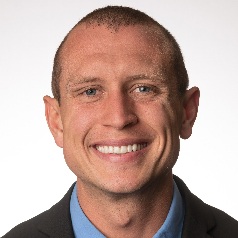I never thought I’d be the type of person applying for medical school scholarships, let alone writing an essay about it. A decade ago, my greatest financial planning was making sure I had enough cash for a gas station hot dog and maybe a roof over my head for the night. My journey into medicine—and financial literacy—did not start with AP Bio in high school or a shadowing opportunity at the local hospital. It started with homelessness, a cattle farm, and a veterinarian who unwittingly changed my life.

John Stalnaker
After high school, I was directionless. I worked whatever jobs I could find—nightclub security, construction, machine operator, sales. They all had one thing in common: a paycheck that vanished as quickly as it came, leaving me with nothing to show for it but sore muscles and a sense that there had to be more to life. Then came the farm.
On a cattle farm, I expected to learn about fixing fences, baling hay, and keeping my boots from sinking in mud. What I didn’t expect was to be inspired by the farm vet. Watching him treat sick cattle with precision and compassion showed me that medicine was a way to combine knowledge with service. That was the spark.
The spark turned into a fire when the farm’s owner, Dr. Smith, who just happened to be a physician, let me shadow him. Seeing how he cared for people confirmed my future.
I didn’t just want a job. I wanted a calling.
But here’s the problem with big dreams: they come with big price tags. Returning to college as a non-traditional student was like starting a marathon in flip-flops. I had to relearn how to study, sacrifice weekends, and say no to countless social events. And while many of my classmates were worried about where to go out on Friday night, I was worried about keeping the lights on at home.
Because by this point, I wasn’t just a student—I was a fiancé and father. Today, I have four kids, ages ranging from 1-year-old to almost 12. They are my motivation and my reality check. Nothing will sharpen your budgeting skills quite like trying to stretch grocery money for a family of six.
I quickly learned that financial literacy wasn’t optional; it was survival. My fiancée and I rely on Medicaid, food stamps, and assistance programs for electricity. Even with that help, we plan carefully, down to the penny. I’ve worked construction, farmed, and studied medicine late into the night, sometimes all in the same week. My kids have seen me study with flashcards on the sidelines of their games and fall asleep at the dinner table after a long shift.
They’ve also seen that persistence pays off.
The White Coat Investor book was a game-changer. I used to think “investing” was something for people in suits on Wall Street, not someone who once lived out of a car. But this book helped me realize that financial success in medicine doesn’t come from luck; it comes from intentional decisions, like living below your means, avoiding debt traps, and saying no to the “doctor lifestyle creep.” I don’t have a Roth IRA yet, but I’ve started investing in low-cost index funds, slowly building the foundation for a stable financial future. Knowing the power of compound interest and time in the market has made me more confident that my financial story doesn’t have to end the way it began.
Here’s the truth: medical school isn’t just about anatomy, pathology, or pharmacology. For me, it’s been about survival—financial survival, emotional survival, and physical survival. Balancing lectures with childcare, exams with family emergencies, and rent with tuition has been its own kind of curriculum. But it’s also been the most meaningful education of my life.
Some of my classmates talk about burnout. I get it; I’ve felt it, too. But I’ve also seen what real burnout looks like when you’re working three jobs just to have heat in the winter. I’ve learned that medicine is a privilege, even when it’s hard. And every patient I see, every late-night shift I pull, I carry with me the reminder that I once had nothing. And now I’ve been given the chance to help people who are where I once was.
I want to become a physician who doesn’t just treat disease but treats people with dignity. I want my patients to know that their past doesn’t define their future, because I am living proof of that. And I want my kids to grow up knowing that hard work, faith, and financial responsibility can rewrite a family’s story.
Winning this scholarship wouldn’t just be a line on my CV. It would be an investment in a family that has sacrificed everything to get here. It would mean fewer sleepless nights wondering if the next tuition bill will mean choosing between groceries and textbooks. It would be a reminder that resilience, faith, and even a little humor still have a place in medicine.
My story is not conventional, but neither is my motivation. I didn’t grow up dreaming of medicine—I grew into it through grit, sweat, and the kindness of mentors who believed in me when I had nothing. Now, as I stand on the cusp of becoming a physician, I carry not just the lessons of medicine but the lessons of finance: live intentionally, plan wisely, and give generously.
The White Coat Investor has taught me that money is not the goal but rather the tool. My goal is to heal, to serve, and to leave a legacy for my family that looks nothing like the instability of my youth. And with your help, I’ll continue building that future, one patient, one paycheck, and one wise decision at a time. God bless.